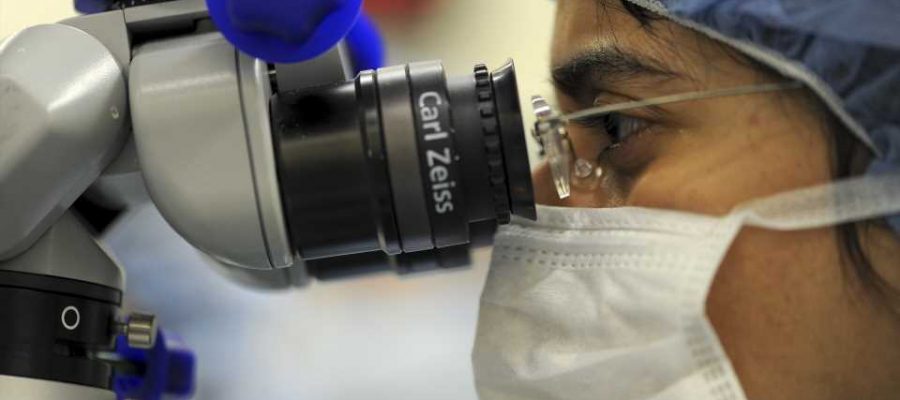
Before her mother’s kidney transplant, Arianna Barrett watched a medical professional carefully extract stem cells from her own neck with a feeling that she was observing scientific developments in real time.
Since her mother was diagnosed with kidney disease, Barrett, a 36-year-old Chicago teacher, always knew she wanted to donate a kidney to her mother, even though her mother, Margaret Rainey, had reservations about her daughter having a major surgery.
But the mother-daughter pair did more than share an organ. Doctors transplanted stem cells from Barrett into her mother to teach Rainey’s immune system to recognize her new kidney.
“It was a little daunting, but so cool to see how far the medicine has come,” Barrett said.
Rainey, a 54-year-old Chicago resident, is participating in a yearslong clinical trial at Northwestern Medicine that researchers hope will revolutionize transplants with a stem cell treatment meant to reduce the risk a body will reject a transplanted organ.
It means that, if the treatment is successful, organ recipients won’t have to take drugs to stop the body from rejecting the organ.
Those drugs reduce the body’s immune response—a danger for transplant recipients during the COVID-19 pandemic. They also come with increased risk of diabetes and some cancers, doctors said. And in the end, after years with the transplant, the body may still eventually reject the organ.
“We’re robbing Peter to pay Paul, if you will, with these medications,” said Dr. Joseph Leventhal, a professor of surgery and director of kidney transplantation at Northwestern Medicine, who leads the clinical study.
Rainey, who had her kidney transplant in 2019, is living without having to take immunosuppressants. She doesn’t have to remember to take a handful of pills each day and live with their side effects. She was tested for antibodies after receiving the COVID-19 vaccine and learned her immune system recognized the vaccine.
She recently caught COVID, but said she had mild symptoms.
Rainey was formerly a dancer for Chicago’s Muntu Dance Theatre, which performs traditional African dance. She recently decided to get back into dance, and traveled to Michigan for a dance conference. She wore a mask throughout the classes, but relished getting back into her passion.
“It was a really great experience,” she said.
Northwestern worked with other medical centers to start the clinical trial in 2009. In the trial’s first two phases, the researchers tested the safety and efficacy of the treatment with 37 patients enrolled between 2009 and 2016. Leventhal said 26 of those patients were able to be taken off immunosuppressants, and six have been off for more than a decade.
“One of the patients who I’ve talked to tells me, I forget that I’m a transplant recipient because I’m living a normal life,” Leventhal said.
Rainey was enrolled for the third phase of the trial, which expanded to 120 patients participating in hospitals across the country.
Rainey’s path to a diagnosis of kidney disease was rocky, as she encountered some dismissive doctors who didn’t realize what was happening to her until years after her first symptoms. About a decade ago, Rainey said, she was diagnosed with high blood pressure, even though she was a dancer and a vegetarian. She felt that something more was wrong, but she said doctors believed she suffered from high blood pressure because her mother did. Her mother, though, was able to take a pill and reduce her blood pressure, while Rainey’s remained out of control.
“I felt like they didn’t want to really look for any other causes because I was African American, and my mother had high blood pressure,” she said.
Years later, she was diagnosed with kidney disease and lived on dialysis for seven years.
While researching her options, Rainey and her daughter went to a kidney disease conference in Champaign-Urbana and learned about the clinical trial.
“We signed up for (a class) saying you can get a transplant and never have to take medication again,” she said. “Normally you have to take medication for the rest of your life.”
Barrett, too, studiously did her research, and they tried to sign up for the clinical trials, finally enrolling in the phase three trial.
The trial is only testing the treatment with living donors, though Leventhal hopes to someday test it with deceased donors as well.
But with the need for a living donor, Barrett eagerly stepped up, while Rainey worried for her daughter.
“As a parent, you have those feelings … you just think of the worst outcome,” Rainey said.
But her daughter lost 80 pounds to qualify as a donor. She got biweekly injections to increase her production of stem cells, then had them extracted.
“We had done the research and wanted to do the clinical trial, to be a part of the process,” she said. “To see it happening in real time is a beautiful thing.”
After the transplant surgery, Barrett and her mother were convalescing on the same floor. She walked to her mother’s room and saw her for the first time with a working kidney.
Source: Read Full Article
